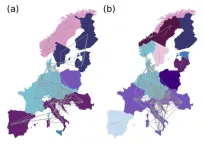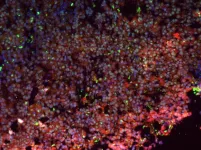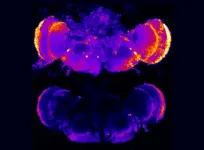(Press-News.org) When it comes to managing blood sugar levels, most people think about counting carbs. But new research from the University of British Columbia shows that, for some, it may be just as important to consider the proteins and fats in their diet.
The study, published today in Cell Metabolism, is the first large-scale comparison of how different people produce insulin in response to each of the three macronutrients: carbohydrates (glucose), proteins (amino acids) and fats (fatty acids).
The findings reveal that production of the blood sugar-regulating hormone insulin is much more dynamic and individualized than previously thought, while showing for the first time a subset of the population who are hyper-responsive to fatty foods.
“Glucose is the well-known driver of insulin, but we were surprised to see such high variability, with some individuals showing a strong response to proteins, and others to fats, which had never been characterized before,” said senior author Dr. James Johnson, a professor of cellular and physiological sciences at UBC. “Insulin plays a major role in human health, in everything from diabetes, where it is too low, to obesity, weight gain and even some forms of cancer, where it is too high. These findings lay the groundwork for personalized nutrition that could transform how we treat and manage a range of conditions.”
For the study, the researchers conducted tests on pancreatic islets from 140 deceased male and female donors across a wide age range. The islets were exposed to each of the three macronutrients, while the researchers measured the insulin response alongside 8,000 other proteins.
Although most donors’ islet cells had the strongest insulin response to carbohydrates, approximately nine per cent responded strongly to proteins, while another eight per cent of the donor cells were more responsive to fats than any other nutrient—even glucose.
“This research challenges the long-held belief that fats have negligible effects on insulin release in everyone,” says first author Dr. Jelena Kolic, a research associate in the Johnson lab at UBC. “With a better understanding of a person’s individual drivers of insulin production, we could potentially provide tailored dietary guidance that would help people better manage their blood sugar and insulin levels.”
The research team also examined a subset of islet cells from donors who had Type 2 diabetes. As expected, these donor cells had a low insulin response to glucose. However, the researchers were surprised to see that their insulin response to proteins remained largely intact.
“This really bolsters the case that protein-rich diets could have therapeutic benefits for patients with Type 2 diabetes and highlights the need for further research into protein-stimulated insulin secretion,” said Dr. Kolic.
The team conducted a comprehensive protein and gene expression analysis on the pancreatic islet cells, providing insights into the molecular and cellular characteristics that shape insulin production. In the future, the researchers say it could be possible use genetic testing to determine which macronutrients are likely to trigger a person’s insulin response.
As a next step, the researchers hope to expand their work into clinical studies that would test insulin responsiveness to the trio of macronutrients in a real-world setting, and to begin developing personalized nutrition approaches based on the findings.
This research was supported by the Canadian Institutes for Health Research and JDRF Canada. The researchers would like to thank the organ donors and their families for their gift that enabled this research, made through the Human Organ Procurement and Exchange program and Trillium Gift of Life Network.
Interview language(s): English
END
Proteins and fats can drive insulin production for some, paving way for tailored nutrition
New UBC research shows how insulin-triggering nutrients vary from person to person, with implications for personalized nutrition strategies
2024-07-02
ELSE PRESS RELEASES FROM THIS DATE:
Melting of Alaskan glaciers accelerating faster than previously thought
2024-07-02
Melting of glaciers in a major Alaskan icefield has accelerated and could reach an irreversible tipping point earlier than previously thought, new research suggests.
The research, led by scientists at Newcastle University, UK, found that glacier loss on Juneau Icefield, which straddles the boundary between Alaska and British Columbia, Canada, has increased dramatically since 2010.
The team, which also included universities in the UK, USA and Europe, looked at records going back to 1770 and identified three distinct periods in how icefield volume changed. They saw that glacier volume loss remained fairly ...
Genetic study points to oxytocin as possible treatment for obesity and postnatal depression
2024-07-02
Scientists have identified a gene which, when missing or impaired, can cause obesity, behavioural problems and, in mothers, postnatal depression. The discovery, reported today in Cell, may have wider implications for the treatment of postnatal depression, with a study in mice suggesting that oxytocin may alleviate symptoms.
Obesity and postnatal depression are significant global health problems. Postnatal depression affects more than one in 10 women within a year of giving birth and is linked to an increased risk of ...
What was behind the 2021-2022 energy crisis within Europe?
2024-07-02
WASHINGTON, July 2, 2024 – An energy crisis hit Europe in 2021-2022, following Russia’s invasion of Ukraine, which sent electricity prices skyrocketing — even within countries that don’t rely on Russian gas. It begs the question: Was there more to it?
A team of researchers from the Institute for Energy and Climate Research at Forschungszentrum Jülich, the University of Cologne, and the Norwegian University of Life Sciences had already been working with electricity price data for years, exploring statistics and developing forecasting methods. Adopting a European perspective, ...
Alterations in human gene TRPC5 cause obesity and postpartum depression
2024-07-02
Researchers at Baylor College of Medicine, the University of Cambridge and collaborating institutions have discovered that alterations in the human gene TRPC5 cause obesity and postpartum depression.
Taken together, their studies in cells, animal models and humans showed that TRPC5 acts on distinct neuronal populations in the hypothalamus, a brain region that regulates multiple innate behaviors including feeding, anxiety, socialization and maternal care. The findings, published in the journal Cell, ...
In-hospital delirium and disability and cognitive impairment after COVID-19 hospitalization
2024-07-02
About The Study: In this cohort study of 311 hospitalized older adults with COVID-19, in-hospital delirium was associated with increased functional disability and cognitive impairment over the 6 months following discharge. Older survivors of a COVID-19 hospitalization who experience in-hospital delirium should be assessed for disability and cognitive impairment during postdischarge follow-up.
Corresponding author: To contact the corresponding author, Lauren E. Ferrante, M.D., M.H.S., email lauren.ferrante@yale.edu.
To access the embargoed study: Visit our For The Media website at this link https://media.jamanetwork.com/
(doi: 10.1001/jamanetworkopen.2024.19640)
Editor’s ...
E-cigarette use and lung cancer screening uptake
2024-07-02
About The Study: In this cross-sectional study, e-cigarette use was independently associated with lower use of lung cancer screening, particularly among individuals who had quit smoking combustible cigarettes. Emerging research suggests that e-cigarettes contain definite and probable carcinogens and cause similar cancer-associated gene deregulations as combustible tobacco.
Corresponding author: To contact the corresponding author, Qian Wang, M.D., M.P.H., email qian.wang@uhhospitals.org.
To access the embargoed study: Visit our For The Media website at this link https://media.jamanetwork.com/
(doi: ...
A study led by UPF describes how insulinomas, a rare type of pancreatic beta cell tumor, form
2024-07-02
An experimental study led by Pompeu Fabra University describes the mechanism whereby insulinomas, a rare type of neuroendocrine tumour that affects pancreatic beta cells. According to the study, insulinomas are the result of the accumulation of rare mutations that lead to a homogeneous change in the epigenetic profile of pancreatic beta cells. This profile change causes beta cells to express unusually high levels of oncogenes, growth and transcription factors, and genes related to insulin production.
Insulinomas are rare pancreatic neuroendocrine tumours that involve the excessive growth of beta cells, which are responsible for secreting insulin. Often, they are diagnosed ...
NIH researchers discover a new face-detecting brain circuit
2024-07-02
Scientists at the National Institutes of Health (NIH) have uncovered a brain circuit in primates that rapidly detects faces. The findings help not only explain how primates sense and recognize faces, but could also have implications for understanding conditions such as autism, where face detection and recognition are often impaired from early childhood. The newly discovered circuit first engages an evolutionarily ancient part of the brain called the superior colliculus, which can then trigger the eyes and head to turn for a better look. This better view enables different brain areas in the temporal cortex to engage ...
Potential new target for early treatment of Alzheimer's disease
2024-07-02
UNIVERSITY PARK, Pa. — A class of proteins that regulates cell repair and enhances cell growth-signaling systems could be a promising new target for the treatment of Alzheimer's and other neurodegenerative diseases, according to a new study led by researchers at Penn State. They found that disrupting necessary sugar modifications of these proteins promotes cell repair and reverses cellular abnormalities that occur in neurodegenerative diseases.
The study appeared today (July 2) in the journal iScience, and the researchers have a patent related to this work.
“Strategies ...
Subnormal serum liver enzyme levels
2024-07-02
Liver diseases are commonly diagnosed using serum enzyme assays, particularly for aspartate aminotransferase (AST), alanine aminotransferase (ALT), alkaline phosphatase (ALP), gamma-glutamyl transpeptidase (GGT), and 5'-nucleotidase (5'-NT). While elevated levels of these enzymes are typically associated with liver and bile duct injuries, subnormal levels can also indicate various pathologies. This review consolidates current knowledge on diseases linked with subnormal liver enzyme levels, focusing on their pathogenesis, specificity, and treatment ...
LAST 30 PRESS RELEASES:
COVID-19 vaccination during pregnancy may help prevent preeclampsia
Menopausal hormone therapy not linked to increased risk of death
Chronic shortage of family doctors in England, reveals BMJ analysis
Booster jabs reduce the risks of COVID-19 deaths, study finds
Screening increases survival rate for stage IV breast cancer by 60%
ACC announces inaugural fellow for the Thad and Gerry Waites Rural Cardiovascular Research Fellowship
University of Oklahoma researchers develop durable hybrid materials for faster radiation detection
Medicaid disenrollment spikes at age 19, study finds
Turning agricultural waste into advanced materials: Review highlights how torrefaction could power a sustainable carbon future
New study warns emerging pollutants in livestock and aquaculture waste may threaten ecosystems and public health
Integrated rice–aquatic farming systems may hold the key to smarter nitrogen use and lower agricultural emissions
Hope for global banana farming in genetic discovery
Mirror image pheromones help beetles swipe right
Prenatal lead exposure related to worse cognitive function in adults
Research alert: Understanding substance use across the full spectrum of sexual identity
Pekingese, Shih Tzu and Staffordshire Bull Terrier among twelve dog breeds at risk of serious breathing condition
Selected dog breeds with most breathing trouble identified in new study
Interplay of class and gender may influence social judgments differently between cultures
Pollen counts can be predicted by machine learning models using meteorological data with more than 80% accuracy even a week ahead, for both grass and birch tree pollen, which could be key in effective
Rewriting our understanding of early hominin dispersal to Eurasia
Rising simultaneous wildfire risk compromises international firefighting efforts
Honey bee "dance floors" can be accurately located with a new method, mapping where in the hive forager bees perform waggle dances to signal the location of pollen and nectar for their nestmates
Exercise and nutritional drinks can reduce the need for care in dementia
Michelson Medical Research Foundation awards $750,000 to rising immunology leaders
SfN announces Early Career Policy Ambassadors Class of 2026
Spiritual practices strongly associated with reduced risk for hazardous alcohol and drug use
Novel vaccine protects against C. diff disease and recurrence
An “electrical” circadian clock balances growth between shoots and roots
Largest study of rare skin cancer in Mexican patients shows its more complex than previously thought
Colonists dredged away Sydney’s natural oyster reefs. Now science knows how best to restore them.
[Press-News.org] Proteins and fats can drive insulin production for some, paving way for tailored nutritionNew UBC research shows how insulin-triggering nutrients vary from person to person, with implications for personalized nutrition strategies



